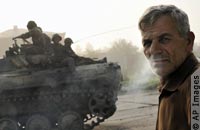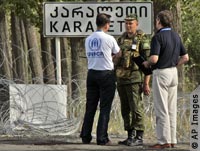PEACE & SECURITY | Creating a more stable world
12 September 2008
U.S. Warns Against New Russian Troop Deployments to Georgia
Moscow must stop ignoring its cease-fire commitments, say officials

Washington — Russian President Dmitry Medvedev’s proposal to position large troop garrisons in Georgia’s separatist regions threatens to further undermine the fragile European Union-brokered truce in the ongoing crisis in the South Caucasus, a senior U.S. official says.
“President Medvedev’s comments that around 7,600 Russian troops will be permanently deployed to Abkhazia and South Ossetia is in clear contravention to the ceasefire agreement,” State Department spokesman Sean McCormack said September 11, noting that Russian and Georgian forces are required to pull back to positions they held before hostilities broke out August 7.
While the bulk of Russia’s invasion force left Georgia August 22, Moscow has maintained 32 military checkpoints deep inside undisputed Georgian territory. The Kremlin called them “security zones,” but the international community recognizes them as fortified chokepoints, says U.S. Special Envoy Matthew Bryza. The cease-fire agreement, which both sides signed August 14, was brokered by the European Union and the Organization for Security and Cooperation in Europe.
“The cease-fire accord does not establish a buffer zone,” Bryza told the U.S. Helsinki Commission on September 10, “and it does not allow the Russians to have any forces whatsoever in places such as Poti, 200 kilometers from South Ossetia.”
Russian forces at a checkpoint in Karaleti have turned back humanitarian aid shipments bound for communities south of South Ossetia’s capital, McCormack said, a violation of Russia’s truce commitments to allow the free flow of humanitarian assistance to all areas of Georgia.

Russia has further compounded international criticism with a third violation of the cease-fire: the Kremlin’s decision to officially recognize the two breakaway regions as independent nations. While only one other country, Nicaragua, has followed Russia’s lead, dozens of others, including Russia’s partners in the G8 and the Shanghai Cooperation Organization — which includes China, Kazakhstan, Kyrgyz Republic, Tajikistan and Uzbekistan — have criticized the move as an attempt to forcibly redraw a neighbor’s borders, and also a reversal of U.N. Security Council resolutions previously supported by Russia.
Reports from the region suggest that Russian troops have at last started pulling back from positions outside Georgia’s Black Sea port of Poti and its western city of Senaki, as pledged in a September 8 Moscow meeting between Medvedev and French President Nicolas Sarkozy, who currently holds the European Union’s rotating presidency.
Under the latest deal, all remaining Russian forces are expected to pull back as far as South Ossetia and Abkhazia by October 1, when 200 EU civilian cease-fire military monitoring observers will be deployed to the region to augment ongoing U.N. and OSCE observer missions. International talks on the future of Georgia’s two Moscow-backed breakaway regions will follow in Geneva October 15.
Additional Russian troop deployments to South Ossetia and Abkhazia would be yet another violation of Russia’s commitments, say officials, as would actions to prevent European monitors from entering the separatist regions.
“We insist that Russia uphold its commitments,” McCormack said.
McCormack’s statement and Bryza’s remarks are available from America.gov.
For more information, see Crisis in Georgia.
